| Listing 1 - 10 of 14 | << page >> |
Sort by
|
Article
Abstract | Keywords | Export | Availability | Bookmark
 Loading...
Loading...Choose an application
- Reference Manager
- EndNote
- RefWorks (Direct export to RefWorks)
COMPLEXITE --- CHAOS --- EMERGENCE --- AUTO-ORGANISATION --- COMPLEXITE --- CHAOS --- EMERGENCE --- AUTO-ORGANISATION
Book

ISBN: 9791095990130 Year: 2015 Publisher: Toulouse : EuroPhilosophie Éditions,
Abstract | Keywords | Export | Availability | Bookmark
 Loading...
Loading...Choose an application
- Reference Manager
- EndNote
- RefWorks (Direct export to RefWorks)
Les trois tomes de « Fichte : la philosophie de la maturité » regroupent les contributions faites en 2002 par les membres du Groupe d’Études Fichtéennes de Langue Française (GEFLF) lors des colloques de Louvain-la-Neuve et d’Aix-en-Provence. Le premier tome traite des questions de philosophie fondamentale posées par la dernière philosophie de Fichte : le rapport de l’ontologie et du transcendantalisme, de l’absolu et du phénomène, l’essence de la manifestation, la doctrine de l’image, la théorie de la réflexivité.
Philosophy --- conscience --- phénoménologie --- cognitivisme --- attention --- auto-organisation
Article
Abstract | Keywords | Export | Availability | Bookmark
 Loading...
Loading...Choose an application
- Reference Manager
- EndNote
- RefWorks (Direct export to RefWorks)
LIMITES --- MORPHOGENESE --- KARST --- GEOGRAPHIE PHYSIQUE --- EPISTEMOLOGIE --- THEORIE --- FORME --- AUTO-ORGANISATION --- LIMITES --- MORPHOGENESE --- KARST --- GEOGRAPHIE PHYSIQUE --- EPISTEMOLOGIE --- THEORIE --- FORME --- AUTO-ORGANISATION
Dissertation
Year: 2023 Publisher: Liège Université de Liège (ULiège)
Abstract | Keywords | Export | Availability | Bookmark
 Loading...
Loading...Choose an application
- Reference Manager
- EndNote
- RefWorks (Direct export to RefWorks)
Ce mémoire se présente sous la forme d'un travail d'enquête à partir des zad comme espaces vivants et hétérotopiques. Il ouvre plus largement une réflexion sur le commun et les pratiques autogestionnaires dans le cadre d'une occupation spatiale.
espace --- territoire --- pragmatisme --- expérimentation --- zad --- hétérotopies --- Dewey --- Foucault --- commun --- propriété --- occupation --- autogestion --- auto-organisation --- Despret --- imaginaire --- Arts & sciences humaines > Philosophie & éthique
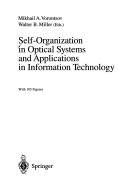
ISBN: 3540570861 9783540570868 3642975275 3642975259 Year: 1995 Volume: 66 Publisher: Berlin Heidelberg New York Springer
Abstract | Keywords | Export | Availability | Bookmark
 Loading...
Loading...Choose an application
- Reference Manager
- EndNote
- RefWorks (Direct export to RefWorks)
Auto-organisation (Théorie des systèmes) --- Lasers --- Learning systems (Automatic control) --- Niet-lineaire optica --- Nonlinear optics --- Optica [Niet-lineaire ] --- Optics [Nonlinear ] --- Optique non-linéaire --- Self-optimizing systems --- Self-organizing systems --- Systèmes auto-optimalisants --- Systèmes auto-organisés --- Systèmes d'apprentissage (Commande automatique) --- Zelfregelende systemen
Book
ISSN: 2030501X ISBN: 9782804102029 2804102025 Year: 2008 Volume: *46 Publisher: Bruxelles : De Boeck,
Abstract | Keywords | Export | Availability | Bookmark
 Loading...
Loading...Choose an application
- Reference Manager
- EndNote
- RefWorks (Direct export to RefWorks)
Depuis quelques années, le concept de systèmes auto-organisateurs - les systèmes complexes où le hasard et le chaos semblent évoluer en un ordre inattendu - a rassemblé les chercheurs de nombreux domaines, de l'intelligence artificielle à la chimie, de l'étude de l'évolution à la géologie. Mais peu d'économistes ont participé à ces débats. Mais qu'est-ce qu'un système auto-organisateur? En quoi l'économie est-elle bien un tel système auto-organisateur et en quoi est-il important de le traiter explicitement et méthodologiquement comme tel? L'auteur s'appuie sur des illustrations simples de systèmes complexes: l'émergence de centres urbains, la répartition ségrégationniste de populations ou encore l'achat de vidéos. Il démontre à partir de là comment les principes qui expliquent la croissance des ouragans et des embryons permettent aussi de comprendre la formation des villes et les cycles d'affaires, comment le principe d'ordre à partir d'instabilité ou d'ordre à partir de croissance aléatoire s'applique aussi aux phénomènes économiques. L'économiste "le plus créatif de sa génération" (The Economist) souligne dès le départ que le système économique est un système complexe auto-organisateur par nature et offre un point de vue nouveau et surprenant sur la façon dont l'économie se structure dans l'espace et le temps.
Auto-organisation (Théorie des systèmes) --- Economic theory --- Economics --- Economie (Science) --- Economie (Wetenschap) --- Economische wetenschap --- Learning systems (Automatic control) --- Political economy --- Politieke economie --- Sciences économiques --- Self-optimizing systems --- Self-organizing systems --- Systèmes auto-optimalisants --- Systèmes auto-organisés --- Systèmes d'apprentissage (Commande automatique) --- Zelfregelende systemen --- Économie politique --- Space in economics --- Espace (économie politique) --- Mathematical models --- Modèles mathématiques --- Systèmes auto-organisés. --- Modèles mathématiques. --- Systèmes auto-organisés. --- Espace (économie politique) --- Modèles mathématiques.
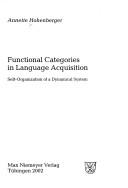
ISBN: 3484304561 3110923521 9783110923520 9783484304567 Year: 2011 Volume: 456 Publisher: Tübingen
Abstract | Keywords | Export | Availability | Bookmark
 Loading...
Loading...Choose an application
- Reference Manager
- EndNote
- RefWorks (Direct export to RefWorks)
This study investigates the acquisition of Functional Categories (e.g., INFL (AGR, TNS), DET, COMP) from the perspective of self-organization in generative grammar. Language is conceived of as a dynamical system which evolves in time and bifurcates when critical thresholds are reached. The emergence of syntax as evidenced by the acquisition of Functional Categories is the major bifurcation in child language acquisition. Target values of syntactic parameters are attractors which children approach on individual trajectories. A proposed tripartite scenario of change - from a simple stable state A, via symmetry-breaking in a liminal phase B characterized by variation, to a new complex stable state C - accounts for the dynamics in early grammatical development. Traditional generative issues, such as the acquisition of case-marking, finiteness, V2, and wh-questions, are discussed as well as new issues, such as functional neologisms, and sentential blends. Dynamical notions like precursor, oscillation, symmetry-breaking, and trigger are important explanatory tools. The growing child phrase marker is a fractal mental object which represents syntactic information by way of self-similar extended projections. The book addresses researchers in language acquisition from various theoretical camps: generative, functional, connectionist, by giving new answers to old questions in the light of a novel challenging theory: self-organization.
Acquisition du langage --- Acquisition of language --- Auto-organisation (Théorie des systèmes) --- Fonctionalisme (Linguistique) --- Functionalism (Linguistics) --- Functionalisme (Taalwetenschap) --- Langage [Acquisition du ] --- Language acquisition --- Language development in children --- Learning systems (Automatic control) --- Self-optimizing systems --- Self-organizing systems --- Systèmes auto-optimalisants --- Systèmes auto-organisés --- Systèmes d'apprentissage (Commande automatique) --- Taalverwerving --- Zelfregelende systemen --- Language acquisition. --- Grammar, Comparative and general --- Language and languages --- Syntax --- Developmental linguistics --- Developmental psycholinguistics --- Psycholinguistics, Developmental --- Interpersonal communication in children --- Psycholinguistics --- Syntax. --- Acquisition --- Linguistics --- Philology --- Grammar, Comparative and general Syntax
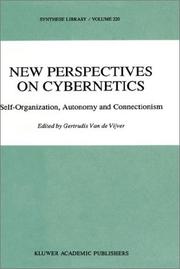
ISBN: 0792315197 9048141079 9401580626 9780792315193 Year: 1992 Volume: v. 220 Publisher: Dordrecht Boston London : Kluwer Academic Publishers,
Abstract | Keywords | Export | Availability | Bookmark
 Loading...
Loading...Choose an application
- Reference Manager
- EndNote
- RefWorks (Direct export to RefWorks)
Auto-organisation (Théorie des systèmes) --- Automatic control --- Automatische controle --- Controle automatique --- Cybernetica --- Cybernetics --- Cybernétique --- Learning systems (Automatic control) --- Self-optimizing systems --- Self-organizing systems --- Systèmes auto-optimalisants --- Systèmes auto-organisés --- Systèmes d'apprentissage (Commande automatique) --- Zelfregelende systemen --- Cybernetics. --- Self-organizing systems. --- Automatic control. --- Commande automatique --- Cybernétique. --- Systèmes auto-organisés. --- Commande automatique. --- Intellect --- Learning ability --- Synergetics --- Mechanical brains --- Control theory --- Electronics --- System theory --- Control engineering --- Control equipment --- Engineering instruments --- Automation --- Programmable controllers --- Hulpwetenschappen --- filosofie --- filosofie. --- Filosofie. --- Cybernétique --- Systèmes auto-organisés --- Cybernétique. --- Systèmes auto-organisés.
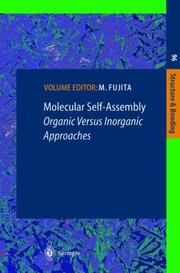
ISBN: 3540669485 354046591X Year: 2000 Volume: 96 Publisher: New York, NY ; London : Springer-Verlag,
Abstract | Keywords | Export | Availability | Bookmark
 Loading...
Loading...Choose an application
- Reference Manager
- EndNote
- RefWorks (Direct export to RefWorks)
Self-assembly is undoubtedly a topic of special interest in current chemistry and is related to very wide scientific areas. Recent progress in this field seems to be featured by the construction of well-defined discrete systems exploiting complementary hydrogen bonding as well as coordination bonding. Seven leading international experts introduce the current topics in this very interesting field, focusing on two major subjects: organic assemblies and inorganic assemblies. All researchers who are interested in molecular recognition, material science, nanotechnology, and supramolecular chemistry will welcome this book as an inspiring source for creative research ideas.
Anorganische chemie --- Auto-organisation (Théorie des systèmes) --- Chemie [Anorganische ] --- Chemie [Organische ] --- Chemistry [Inorganic ] --- Chemistry [Organic ] --- Chimie inorganique --- Chimie organique --- Inorganic chemistry --- Learning systems (Automatic control) --- Moleculaire structuur --- Molecular structure --- Organic chemistry --- Organische chemie --- Organische scheikunde --- Scheikunde [Organische ] --- Self-optimizing systems --- Self-organizing systems --- Structure moléculaire --- Systèmes auto-optimalisants --- Systèmes auto-organisés --- Systèmes d'apprentissage (Commande automatique) --- Zelfregelende systemen --- Chemistry. --- Inorganic chemistry. --- Organic chemistry. --- Physical chemistry. --- Condensed matter. --- Inorganic Chemistry. --- Organic Chemistry. --- Physical Chemistry. --- Condensed Matter Physics. --- Chemical bonds. --- Condensed materials --- Condensed media --- Condensed phase --- Materials, Condensed --- Media, Condensed --- Phase, Condensed --- Liquids --- Matter --- Solids --- Chemistry, Theoretical --- Physical chemistry --- Theoretical chemistry --- Chemistry --- Inorganic compounds --- Self-assembly
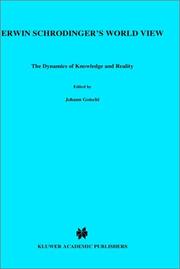
ISBN: 0792316940 9401050716 9401124280 Year: 1992 Volume: vol 16 Publisher: Dordrecht Boston London Kluwer Academic
Abstract | Keywords | Export | Availability | Bookmark
 Loading...
Loading...Choose an application
- Reference Manager
- EndNote
- RefWorks (Direct export to RefWorks)
Auto-organisation (Théorie des systèmes) --- Filosofie van de natuur --- Learning systems (Automatic control) --- Leven --- Leven -- Filosofie --- Life --- Life -- Philosophy --- Nature (Philosophie) --- Nature (Philosophy) --- Nature [Philosophie de la ] --- Nature [Philosophy of ] --- Nature--Philosophie --- Nature--Philosophy --- Natuur (Filosofie) --- Natuur [Filosofie van de ] --- Natuur--Filosofie --- Natuurfilosofie --- Philosophie de la nature --- Philosophy of nature --- Self-optimizing systems --- Self-organizing systems --- Systèmes auto-optimalisants --- Systèmes auto-organisés --- Systèmes d'apprentissage (Commande automatique) --- Vie --- Vie -- Philosophie --- Wijsbegeerte van de natuur --- Zelfregelende systemen --- Schrodinger, Erwin --- Life. --- Philosophy of nature. --- Physics --- Self-organizing systems. --- Philosophy. --- Cybernetics --- Intellect --- Learning ability --- Synergetics --- Nature --- Nature, Philosophy of --- Natural theology --- Philosophy --- Schrödinger, Erwin, --- Schredinger, Ervin, --- Schrödinger, E. --- Schroedinger, Erwin, --- Schrödinger, Erwin, --- Schrödinger, Erwin, 1887-1961. --- Physics - Philosophy.
| Listing 1 - 10 of 14 | << page >> |
Sort by
|

 Search
Search Feedback
Feedback About UniCat
About UniCat  Help
Help News
News